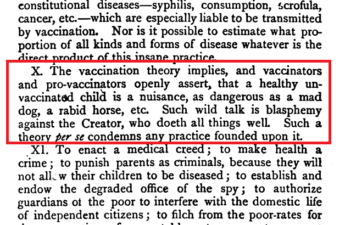
by Stephen Halbrook
Other posts in this series
Scripture teaches we are not to do evil that good may come:
And not rather, (as we be slanderously reported, and as some affirm that we say,) Let us do evil, that good may come? whose damnation is just. (Romans 3:8)
There are some who realize that vaccination can harm, but nevertheless justify it on the notion that it helps more people than it harms.
But even if this isn’t completely false (it is), as we can see from Scripture, this is the wrong approach because the ends do not determine the morality of an action. Rather, it is the means: all moral behavior must be warranted by God’s commands in Scripture, and such commands can never be ignored in order to achieve a desired outcome — no matter how good the desired outcome is believed to be.
And so, biblically speaking, the question is not how beneficial the results of vaccination might be (the ends), but whether or not the practice of vaccination is inherently lawful (the means). If vaccination is inherently unlawful, then it has no moral justification whatsoever.
So, is vaccination inherently unlawful? Yes. To give just one reason, as we previously have shown, vaccination unlawfully endangers and harms others and is therefore a violation of the Sixth Commandment.
Since, then, we cannot do evil that good may come, violating the Sixth Commandment cannot be justified by vaccination: we cannot vaccinate (that is, doing evil by unlawfully endangering and harming others) that good (disease immunity) may come.
This condemnation applies to vaccination on both an individual and societal level.
On an individual level, we cannot play Russian Roulette with one’s life in order to protect him from a possible danger (which, in addition to being evil, is nonsensical). And on a societal level, we cannot “kill a few to save many” (which is also nonsensical, since vaccination amounts to killing many to save perhaps none).
The fallacy of the “costs versus benefits” ethic
As we can see from what has been said, the decision to vaccinate should not be based on “costs and benefits,” or whether the possible benefits to one’s health are more likely to exceed the possible costs to one’s health.
This is the predominate “ethic” in the vaccine debate, and wrongfully employed by both sides: appeal to outcome.
The crux of the vaccine debate is morality, or ethics. That is, “ought we to vaccinate?” This must be decided by Scripture, as Jesus is King of kings, and has all authority in Heaven and on Earth. Therefore, He must be obeyed in all areas of life; Scripture equips for every good work (2 Timothy 3:16, 17).
And so, as true as it is that vaccination has too many costs, the foundational ethical argument against vaccination is that it is against God’s law.
(Assuming there are any ethical circumstances where “costs and benefits” are weighed, biblically speaking, they would still not be foundational. Rather, God’s law is.)
So, since God’s law should be our ethical standard, I would not encourage my fellow anti-vaxxers to make the “costs/benefits” philosophy the foundational basis of vaccine ethics.
However, arguing “costs/benefits” is fine to use as a tool to reduce the other side’s “costs/benefits” ethic to absurdity by showing that even if we were to base the decision to vaccinate on costs/benefits, there is a much greater cost to vaccination than any perceived benefit.
What about the lies of Rahab and the Hebrew midwives?
Some might appeal to the lies of the Hebrew midwives (Exodus 1:19) and Rahab (Joshua 2:4) to protect life to justify doing evil that good may come via vaccination. But let’s note a couple things.
First, Christians are divided on whether God actually approved of their lies in the process of saving lives.
Second, they are not analogous cases. Lying to protect life differs from harming life to protect it, which is self-defeating.
Third, if in fact God did approve of their lies and, if consequently, their actions are a model for us, we are justified in engaging in like behavior because it is Scripturally warranted. If there is Scriptural warrant in such an act, it would be doing good that good may come — not doing evil that good may come.
There is no Scriptural warrant, on the other hand, for endangering life to protect it in anything like vaccination. We must guard against misusing biblical principles to justify evil.
What is analogous to the actions of the Egyptian midwives and Rahab is not vaccination, but protecting others from vaccination.
An analogous case regarding the Hebrew midwives and lying might be this: if the state has a mandatory vaccination program, doctors and nurses, to protect their patients, might say that their patients are already vaccinated when they have not been.
An analogous case regarding Rahab might be this: agents of the state are pursuing a couple people who refuse to participate in a mandatory vaccine program so they can punish and vaccinate them. When they ask someone if he knows about their whereabouts, he lies about their whereabouts while hiding them in his house. (Like Corrie ten Boom lying to protect Jews hiding in her house during World War 2.)
Can good come from vaccination anyway?
While some would justify the harms done by vaccination for the greater good, I’m not sure vaccination actually brings about any good to begin with. While it advocates harming a few to save many, it seems to practically amount to harming many to save none.
There is a lesson here: God does not bless disobedience, but curses it. Do you want disease eradication? Trust and obey God, and perhaps He will not judge you with plagues. Don’t vaccinate — which is a plague in and of itself.
What about necessary surgery?
One may say, “What about necessary surgery? Aren’t you taking a risk here in order to receive a benefit? If we can do this, why not vaccinate?”
First, the perspective that vaccines are beneficial is shaped by deception (see, for instance, this, this, and this). But leaving this aside, there is a vast difference between jumping out of a second story window to escape a fire than doing so in the mere possibility that a fire may come.
The first scenario I liken to necessary surgery; the fire is in your house (that is, you already have a physical problem raging inside of you), and thus you may need to “jump out of a second story window” via risky surgery.
The second scenario I liken to vaccination. There is no fire in your house (that is, you have no physical problem, i.e., a disease, or a “fire” inside of you); you are simply endangering yourself by jumping out of a window for a problem that you may never encounter.
And all this for a benefit that may very well be fabricated; moreover, considering that vaccines can actually spread the very disease that they purportedly protect against, being vaccinated may also be likened to a spark that could set the whole neighborhood on fire.
Second, put another way, necessary surgery is taking a potential danger to avoid an existing danger, while vaccination subjects one to an existing danger in the name of avoiding a potential danger. Thus, necessary surgery and vaccination are actually opposite concepts, with the latter being an insane process.
(Why harm yourself to avoid the mere possibility of harm?! Why subject yourself to a dangerous snake bite to possibly avoid a dangerous snake bite in the future?! You may not live to enjoy the “benefit”!!)
Third, necessary surgery involves fixing what is broken — not breaking what already works, as vaccination does to one’s immune system (see more here). Legit surgical procedures attempt, as much as possible, to restore the body to God’s original design. (Of course, while sometimes necessary, surgery is not without risk — for the very reason that it is an unnatural process.)
Necessary surgery is an attempt to offset as much as possible a less than ideal, or unnatural, situation. Vaccination, by contrast, deliberately brings about a less than ideal situation (blood poisoning and a compromised immune system).
A world consistent with the “ends justify the means” vaccine philosophy
In a world consistent with the “ends justify the means” vaccine philosophy, what else would be justified besides killing some to save many via vaccination?
- Torture to extract confessions
- Murder to appease an angry mob
- Wiping out innocent civilians to end a war
- Murdering “unwanted” babies
- Murdering the elderly to save healthcare costs
- Medical experimentation and torture to save many lives in the future
- And on and on
We see the kind of world that the pro-vaccine philosophy legitimizes — death in the name of life. It should be no surprise that the concept of forced vaccination for the greater good provided a justification for the infamous pro-eugenics Buck v. Bell decision in 1927 justifying forced sterilizations.
Concluding thoughts – Duty is ours; results are God’s
The issue in vaccine ethics is not whether there are good results, but whether the action itself is morally lawful according to Scripture. The Bible does not justify disobedience for good outcomes. God’s law is eternal and fixed.
It doesn’t matter how much vaccines are believed to be beneficial. Vaccination, being a poison that endangers one’s health and life and violates the Sixth Commandment, stands condemned by Scripture (Romans 3:8); it is doing evil that good may come.
Christians have to be careful not to morally rationalize vaccines, as Scripture says,
Woe unto them that call evil good, and good evil; that put darkness for light, and light for darkness; that put bitter for sweet, and sweet for bitter! (Isaiah 5:20)
The duty is ours; the results are God’s. We fight disease and all other forms of harm not in disobedience to God, but in trusting and obeying Him. God is in control – not vaccines.
Appendix: “Clericus” on vaccination as doing evil that good may come (1857)
We don’t know who “Clericus” is. He submitted comments to The Homeopathic Record which were published in 1857. Perhaps, given his pseudonym, he was a clergyman.
In his comments, he condemns vaccination as doing evil that good may come, and comments on another statement in Romans 3:8, “whose damnation is just.”:
It has always been a matter of amazement to me that medical men of the old school do not soon perceive the mischief they are doing. I object to their mode of proceeding, (for one cannot call it a system,) on religious grounds also. For what is bleeding, blistering, purging, and setting up one disease to cure another, but “doing evil that good may come?” And does not the inspired apostle say of them whose actions are prompted by such a principle of expediency, their “damnation is just?” But I really do not see why the practice of vaccination should be exempt from this sweeping condemnation. Are we justified in disobeying a divine command from any motives of expediency? But in this as in every other instance of doing evil that good may come, if we are to believe the facts that Mr. Gibbs has brought forward, the good done is only apparent—sickness and mortality have by no means diminished thereby, only they have assumed other forms.
Clericus, “Correspondence: To the Editor of the Homeopathic Record,” in The Homeopathic Record (no. 10, vol. 2) (August 1, 1857), 202.
For further research
Vaccination as Considered “doing evil that good may come” in Christian History
Hear Pastor Kevin Swanson discuss Cannibalism, Pragmatism, Torture on the Rise – Christians and Situational Ethics
If you find this site helpful, please consider supporting our work.


